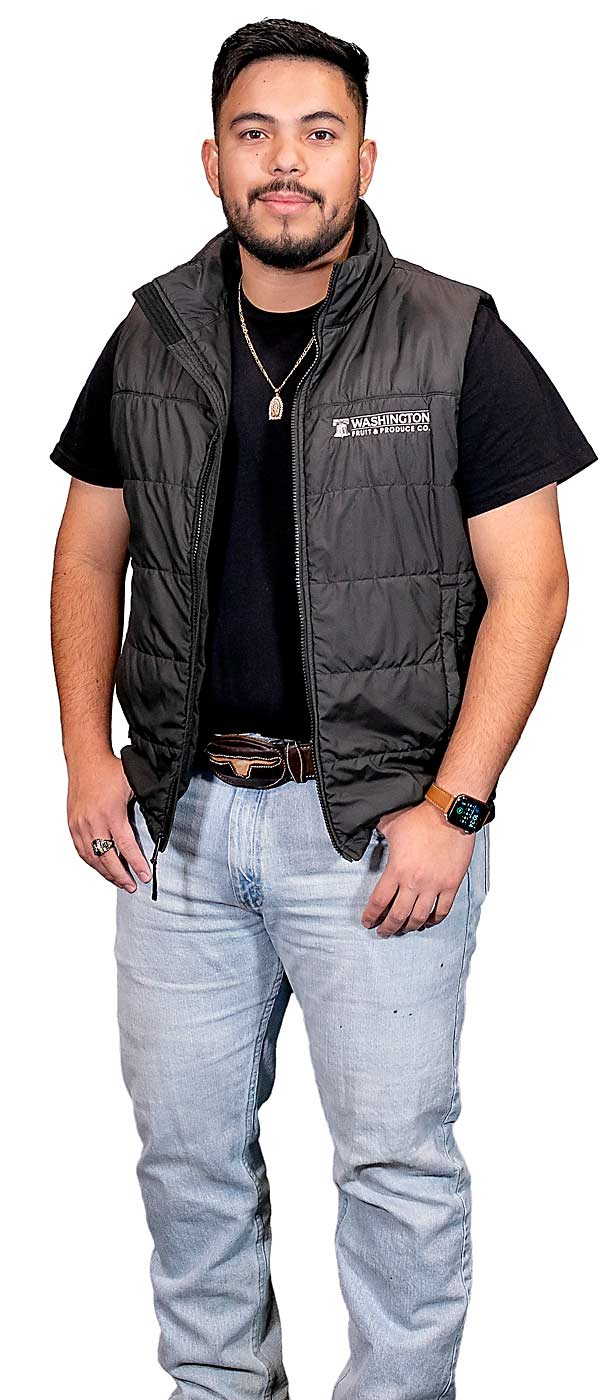family background/Luis is a second-generation farmer who is studying horticulture at Wenatchee Valley College while working at Washington Fruit and Produce. He is the son of Angelica Barajas Birrueta and Manuel Gaitan.
age/23
hometown/Royal City, Washington
crops/apples
role/assistant area manager
business/Washington Fruit and Produce Co.
How did you get your start in ag?
My first interactions weren’t the best. My parents actually took me out to the orchard when I was small to help them pick, and I think it was kind of a scare tactic to make sure I stayed in school. As I grew older, my dad would say, “Go into ag, there’s good jobs, it could be as a fieldman or a foreman and be in charge of the crews.”

At first, I was kind of skeptical, especially with the cold weather and working out in the field. But after being involved in the orchard, I was able to realize that, hey, it’s not just doing manual labor, pruning, thinning or other stuff like that. There’s something that goes behind the scenes like crop load management.
Which is what I currently do when I’m not taking classes. In my job, I’m able to help the foreman make decisions on how the orchard will be thinned or pruned to get our target crop numbers. I’m just thankful for the opportunity to learn about this industry and everything that it has to offer.
What is your impression of ag now that you’re in school?
It’s very interesting to see how ag is evolving. I’m relatively new to the industry, compared to others I work with who have some 30-plus years of experience, and I’m not even 30 years old yet. It’s interesting to see their point of view and learn older farming tactics that I can implement with what I know.
As for school, it’s one thing going to learn from a book, but it’s a different thing being out in the orchard and doing it. In my case, I’m doing it hand in hand. I can see it in the field, then learn about it in my classes. For example, pruning at first is like, “just do it this way.” And now, since I’m going to school, teachers explain the horticulture of what happens when we prune out early.
They teach us good pruning can be better for our yields and better for our return bloom. I’ve learned that when you prune, it’s not necessarily this year’s crop, but it’s this year’s and next year’s. So you have to be careful to not be too aggressive or too light in your pruning because you’ll have to deal with that later in the season or even next year.
How are you making full-time farming and college work?
I’m working full time and going to school almost full time. I’m grateful for the hybrid system at Wenatchee Valley College where I don’t have to be always at school. I can do some school online after work, and then go to the campus and do my labs when I need to.
One of the challenges is that with the job that I do, sometimes we do a lot of work outside, then I also have to do my schoolwork on top of that when I get home. Having a flexible school schedule helps me to do my homework after work and not have to cram and stay up too late.
Why are you pursuing higher education?
Growing up I didn’t know the reasons why we should or shouldn’t do something in the orchard. I feel that school is important to get to know what you’re doing in the field, and it’s also a good opportunity to meet other people your age who are also interested in agriculture and share ideas.
You’re not alone in wanting to work in ag. Another reason — on a personal level — I’m the oldest of five siblings. I want to set an example that it’s never too late to get your education.
We all might take a different path, but I want to be an example to my siblings, my family and, hopefully, my community that it’s never too late to learn about agriculture or something that correlates with agriculture.
What would you tell college administrators about your ag educational needs?
More hands-on experience would be really helpful. A textbook is one thing, but actually going out and doing it is another. There are many factors that go into farming. One of those is weather. What you learn in a book or class is the recommended steps to follow. In the field, if there’s a hailstorm or there’s a snowstorm that delays our work, then we’ll need to play catch-up. Students need to learn how to deal with those situations in the field and understand how to implement management systems. I feel like it would be really helpful for someone starting out if we could go to different farms, look at different scenarios that they’re going through, and learn from them.






Leave A Comment